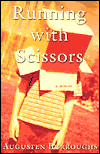Wednesday, September 13, 2006
[Book Review] RUNNING WITH SCISSORS by Augusten Burroughs
 Non-Fiction/Category: Memoir
Non-Fiction/Category: MemoirBeth reviews RUNNING WITH SCISSORS by Augusten Burroughs (St. Martin’s Press, 2002):
I admit it; I don’t read a lot of non-fiction. It rarely holds my interest. Sometimes you’ll catch me with a “real-life” thriller but it’s rare. However, I had heard hype from many people about Running with Scissors and decided it was time to read it, and read it I did. It took me only two days to finish! The book doesn’t read like a memoir; it reads like fiction. Fiction that ranges from funny to scary to disturbed. But definitely like fiction.
Early in the book, Augusten finds a chrome, glass-top coffee table at the garbage dump that he wants to take home. He firmly believed it was “still good.” All it needed was three hours of polishing with Windex and fanning some magazines on top to cover the chipped glass. However, his father refused to allow “trash” in the house. This portion of the book perfectly describes Augusten Burroughs. He is willing to put the “work” in and overlook flaws to accept someone or something he wants or needs. This attitude serves him well when his mother decides she can no longer be his guardian, as she wants to focus on her poetry, and gives custody of him to her therapist. He accepts this new situation, but still loves his divorced, unstable, alcoholic mother. When Augusten goes to live with Dr. Finch, the household also includes the Finch family, other “adopted” children and several patients living in Victorian squalor. The Finch children, Augusten included, are allowed to do whatever they wish: popping prescription pills, playing with an electroshock therapy machine, trashing the house, eating whatever is available at the time and being sexually adventurous. Augusten survives all this with wit, dreaming of a “beauty empire,” performing “You Light Up My Life” for patients in a mental ward, and keeping a journal. He is now a well-published author who survived to tell about his childhood.
Note: Burroughs has written an engaging yet shocking description of his childhood that isn't for everyone: the content and explicit homosexual imagery may limit its appeal. Recommended for the daring in search of a disconcerting experience among the bizarre.
Beth, Highland Branch Library
Labels: Nonfiction, Reviews by Beth
Comments:
Thank you for your review. I, too, remember all the hype surrounding this book and it's long been on my "to read" list.
It's hard to imagine how someone could survive such a chaotic environment. I'm reminded of another hot book, A PIECE OF CAKE by Cupcake Brown, which also reads like fiction.
Ms. Brown is now a lawyer, but she travelled through H*ll and came out on the other side kicking. To cope with her mother's death (she was only 11) and a brutal foster mother, Cupcake made a series of bad, bad, bad choices. But she's here today when so many others are not.
A PIECE OF CAKE is a must read. You mention in your review that some readers may be put off by the explicit sexual content of RUNNING WITH SCISSORS. Some readers of A PIECE OF CAKE may find the vernacular ("street") language difficult at first. Those who persist will realize that Cupcake's negotation of language is an essential part of her triumph.
Who's read Dave Pelzer's A CHILD CALLED "IT"? Any similarites with these two memoirs?
Post a Comment
It's hard to imagine how someone could survive such a chaotic environment. I'm reminded of another hot book, A PIECE OF CAKE by Cupcake Brown, which also reads like fiction.
Ms. Brown is now a lawyer, but she travelled through H*ll and came out on the other side kicking. To cope with her mother's death (she was only 11) and a brutal foster mother, Cupcake made a series of bad, bad, bad choices. But she's here today when so many others are not.
A PIECE OF CAKE is a must read. You mention in your review that some readers may be put off by the explicit sexual content of RUNNING WITH SCISSORS. Some readers of A PIECE OF CAKE may find the vernacular ("street") language difficult at first. Those who persist will realize that Cupcake's negotation of language is an essential part of her triumph.
Who's read Dave Pelzer's A CHILD CALLED "IT"? Any similarites with these two memoirs?



